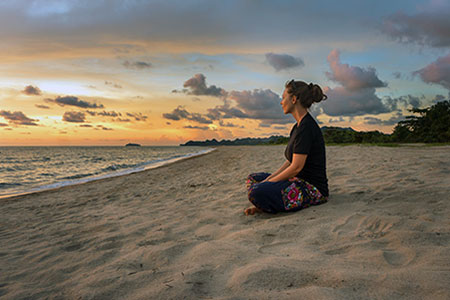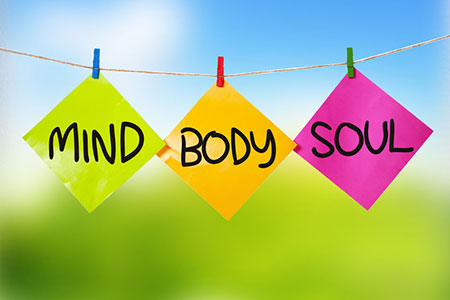mental clarity
Isolation Is An Opportunity For Deeper Practice
 In the challenging circumstances we are now facing all over the world, many people are facing a period of self-isolation, social distancing, and even quarantine, in the interest of public health. Despite its impact on our lives and economy, a lot of good can also come from this, as it can be approached as an opportunity for spiritual retreat and inner growth.
In the challenging circumstances we are now facing all over the world, many people are facing a period of self-isolation, social distancing, and even quarantine, in the interest of public health. Despite its impact on our lives and economy, a lot of good can also come from this, as it can be approached as an opportunity for spiritual retreat and inner growth.
In many spiritual traditions, solitude and isolation is actually considered essential. And it is not a spiritual practice reserved only for gurus, monks or initiates. It is in fact recommended for everyone to spend some alone time with their thoughts, and their spiritual practice.
Now, I am not talking about a luxury weekend retreat somewhere, on a sunny coast, in the mountains, or in a quaint monastery with beautiful gardens and amazing food. That sort of thing you can do any time of the year, and simply call it vacation!
Isolation is the doorway to an internal practice that leads to a more stable, fulfilled life, among other things. Why more stable? Because everything that we do in isolation, even if we are living with someone else, resonates in our mind in a much deeper sense than usual. Of course, if you do live with a partner or family, there is also the option of doing these practices together, but solitary is usually best.
If you regularly meditate, or pray, or repeat mantras, alone and without distractions, you will feel the powerful ‘echoes’ of those practices energetically. This is true and easy to see, as long as you do not turn on the TV immediately afterwards. I call this a deeper practice.
Resentment And The Empath
 Do you have a tendency to re-experience past injustices — real or perceived – while holding on to those old feelings of anger connected to them? If so, it means you are harboring some form of resentment. Empaths are especially prone to resentment, simply because we tap into emotions, past, present, and future, much more than most people.
Do you have a tendency to re-experience past injustices — real or perceived – while holding on to those old feelings of anger connected to them? If so, it means you are harboring some form of resentment. Empaths are especially prone to resentment, simply because we tap into emotions, past, present, and future, much more than most people.
Resentment forms when we become angry towards a person or situation, and then hold onto that anger. Some people harbor their resentments for many years, refusing to let go of it. Over time, whatever caused the original anger and initially led to the resentment, may be forgotten, but the resentment remains. It is like a still-smoldering ember left after the flames of a fire have subsided. The fire no longer rages, but the ember remains smoldering, and all it takes is a spark to set that fire raging again.
For the empath this rekindled ‘fire’ may be triggered every time they enter a new relationship. No harm has been done, yet, but the empath may be so on guard, and overly vigilant to any slight that resembles their past hurt, that it easily sets off another destructive blaze. They expect the worst and try to protect themselves against it, but in the process the thing they fear the most may re-emerge from the past, unhealed resentment.
For many empaths, lack of boundaries also lead to dashed expectations, typically followed by resentment. As an empath, you feel the heart of the person, and know that there is love. Once connected into the, “I know they love me,” their bad behavior can be overlooked. Continue reading
Meditation Made Easy
 No doubt you’ve heard of the many physical, mental and spiritual benefits of meditation. And like many people, you are keen to give it a go, but still don’t know where to start? Well, it doesn’t have to be complicated or intimidating. According to Shunryu Suzuki, the Sōtō Zen master who helped popularize Zen Buddhism in the United States, approaching meditation with a beginner’s mind is actually ideal.
No doubt you’ve heard of the many physical, mental and spiritual benefits of meditation. And like many people, you are keen to give it a go, but still don’t know where to start? Well, it doesn’t have to be complicated or intimidating. According to Shunryu Suzuki, the Sōtō Zen master who helped popularize Zen Buddhism in the United States, approaching meditation with a beginner’s mind is actually ideal.
The most common misconception it that meditation is a state of “thinking of nothing” or “clearing your mind.” It is simply impossible to not think at all. One would basically have to be totally unconscious to achieve that. Instead, meditation is a spiritual practice in which we learn to be more mindful – to center, breathe, and achieve greater calm, inner peace and clarity.
Meditation is about embracing whatever is happening in the present moment, but without getting caught up in any of it. Meditation is about going with the flow, instead of resisting or suppressing your thoughts and feelings.
Meditation in its various forms has been practiced by cultures all over the world for millennia. The oldest documented evidence of the practice of meditation has been found in ancient Indian wall art that dates back to approximately 5,000 to 3,500 BC.
Meditation is an awareness practice, or an enhanced state of consciousness. It does not have to be associated with a specific religion or spiritual tradition. Anyone can meditate, no matter what their belief system. It also does not have to involve sitting or lying passively. It can be anything from coloring mandalas, to taking a walk in nature.
Find Your Balance With Rest And Relaxation
 As I made my way into 2020, with great intentions and resolutions, I found that my life was full of busyness, obligations and a calendar quickly filling up. My 2020 vision board was filled with new goals and dreams, and my employer was eager to roll out new duties and processes to an already demanding workload.
As I made my way into 2020, with great intentions and resolutions, I found that my life was full of busyness, obligations and a calendar quickly filling up. My 2020 vision board was filled with new goals and dreams, and my employer was eager to roll out new duties and processes to an already demanding workload.
I felt hopeful for all the things I wanted to accomplish, ready to take on all of the manifesting and challenges with gusto. Determined to find balance. But, as I look back over the past few weeks, I realize that I was reluctant to get going.
I began to cut corners in my new workout regime, and my meditation practice was not as frequent and strong as I knew it could be. I was not focused on my goals and felt myself burning out quickly in all tasks. My plate was full and the harder I tried, I had to admit, I was just not into it.
I have been feeling absolutely overwhelmed by the huge amount of work I needed to catch up on. My workout goal has only been making me more tired. As I procrastinated on the items on my ‘to do list’ and the commitments piled up, I actually felt more paralyzed than motivated.
Instead of trudging further through the process in a reluctant mood, I then chose to make an abrupt halt for a few days and simply rest. Just rest. Took a break. Time out. I cleared all of my commitments and turned off connection to all work items. I had no need to get out of my pajamas for a few days. I ordered takeout and let any dishes and laundry wait for a while.
Dragging A ‘Knapsack Of Irrelevance’
 Reading for a client recently revealed her toxic work environment, and how one co-worker in particular was making things very unpleasant for her at the office. It reminded me of a short-lived, but very unpleasant working situation I found myself in years ago.
Reading for a client recently revealed her toxic work environment, and how one co-worker in particular was making things very unpleasant for her at the office. It reminded me of a short-lived, but very unpleasant working situation I found myself in years ago.
I was scheduled to work with a woman for a couple of weeks who had an extremely negative attitude and was having a profound effect on me. I shared this unpleasant situation with my boyfriend at the time, and his view was that I was just carrying around a ‘knapsack of irrelevance.’
I was so upset! How could he even think that? However, he did give me some food for thought when he then also said, “Just consider how you will think about this situation in a few years from now. How much will it matter then?”
Well, that did help to put things into perspective. And guess what? Just as he predicted, I forgot all about it until this recent reading with my client! Yes, he was correct. After all the years, remembering that brief work situation made me realize that it never had any major relevance or importance to my life. Stressing and worrying about it was indeed just a waste of time and energy.
I met this particular ex-boyfriend in the fellowship of Alcoholics Anonymous (AA). He was very well-versed in the twelve steps and other tools helpful in achieving and maintaining sobriety. He also gave me an Alcoholics Anonymous pamphlet, which I have to this day, which reads:
The Spiritual Power Of Color
 Color is a bridge between the spiritual and physical and can have powerful impact upon our emotions and well-being. We all have colors that are our favorites, that we use personally, and in our homes, to create a sense of joy, beauty, relaxation or passion and excitement.
Color is a bridge between the spiritual and physical and can have powerful impact upon our emotions and well-being. We all have colors that are our favorites, that we use personally, and in our homes, to create a sense of joy, beauty, relaxation or passion and excitement.
There are many applications for specific colors in various spiritual pursuits and practices. Various meanings are also applied according to cultural beliefs. The Chakras, for instance, are identified by color, as well as their location in the body. Chakra therapy usually also encourages the visualization of colors, while focusing on specific charkas.
Spiritually, color can impart both information, as in the reading of aura colors, and energy, as in healing. The aura is the energy field surrounding living beings which is ‘visible’ to those who are clairvoyantly sensitive.
Color therapy, or chromopathy, is becoming a very popular alternative therapy. The principle of color therapy is that different colors carry different energy frequencies, and therefore they can be used to address specific concerns. Studies have shown that color can affect mood, heart rate, alertness, and impulsivity, to name but a few.
Certain colors tend to have significant spiritual therapeutic properties, and science has recognized the impact of these same colors on the brain and emotions. Green, blue, yellow and red are examples.
Nurturing The Spirit
 Walk into any bookstore in any given city, and you will find a multitude of titles on diet, nutrition and healthy eating. We are warned repeatedly by the experts of the dangers of high cholesterol, the importance of adequate fiber in our diets, low sodium, low fat, less meat, more fruit and vegetables, and a myriad of other dietary guidelines and advice to keep us healthy all the way into eternity!
Walk into any bookstore in any given city, and you will find a multitude of titles on diet, nutrition and healthy eating. We are warned repeatedly by the experts of the dangers of high cholesterol, the importance of adequate fiber in our diets, low sodium, low fat, less meat, more fruit and vegetables, and a myriad of other dietary guidelines and advice to keep us healthy all the way into eternity!
One can also search the Internet and immediately arrive at an astounding number of expert sources telling us not only when, where and how to eat, but also how to play, exercise and live out the rest of our lives with good health and well-being.
There are also a wide variety of applications and activities that we are able to participate in, that promise us mental agility and good memory retention, in order to remain of sound and alert mind. This is accomplished through an assortment of tests, quizzes, puzzles and mazes to show us exactly where we might need additional help and improvement.
All these resources and tools are provided to us in order that we can believe and accept the idea that the present life we are living can stay at the same level, with no need to think things may have to deteriorate over time. Being healthy, both physically and mentally, is of course exceptionally important if we want to stay in balance while we are going about our daily grind.
But what about the spiritual side of us? Granted there are books and programs available for any of us who are seeking such knowledge and information. However, I find it interesting that this vital aspect does not appear to feature in the forefront of our quest for health, well-being and longevity. Many of us go to great lengths to fulfill our obligation to nurture our minds and bodies, but what essential steps do we put in place to nurture the spirit that clearly dwells inside each of us?